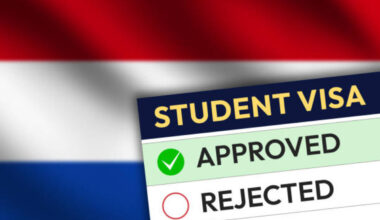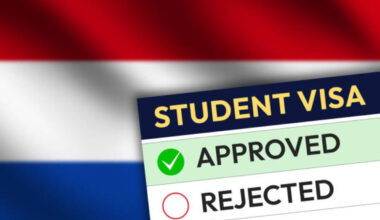There are many international students who consider Canada to be one of the best study destinations in the world. Due to its diverse culture, high-quality educational institutions, and high quality of life, thousands of students choose to study in Canada each year.
Study visas are the first step toward achieving an immigrant’s dream of studying in Canada.
You’ll learn everything you need to know about the Canada Study Visa, including how to apply, eligibility requirements, benefits, and visa sponsorships.
What Is the Process for Getting a Canada Study Visa?
The Canadian government issues Canada Study Visas to foreign nationals who wish to study in Canada.
After studying in Canada for a period of time, students usually receive a visa which permits them to stay for up to 90 days afterward in order to prepare for departure or to apply for further immigration.
A student’s study visa does not allow them to work full-time, but they are allowed to work part-time while studying.
There are certain types of post-study work visas available to graduates seeking Canadian work experience after graduation.
Criteria for eligibility for the Canada Study Visa
Study visa recipients in Canada must meet specific requirements. Student visas require students to prove they are capable of studying in Canada, that they will comply with visa conditions, and that they have sufficient funds to support themselves.
1. Enrollment in a Designated Learning Institution (DLI)
Acceptance into a recognized educational institution is the first step toward obtaining a study visa in Canada. Applicants can only submit visa applications to Designated Learning Institutions (DLI).
2. Evidence of sufficient funds
Your financial support must cover the following expenses:
-
Program fees for the duration of the program.
-
The living expenses of you and any accompanying family members must be covered.
-
Returning home expenses.
Depending on the city and the length of your stay in Canada, you will need different amounts of money. Generally, Canadian students must show at least CAD 10,000 plus tuition for a year of study in Canada.
3. Clean criminal record
An unblemished criminal record is essential for you. It may be necessary for you to provide a police certificate to prove your criminal background.
4. Conducting a health examination
For those living abroad for a long time, medical examinations may be necessary to ensure they meet the health requirements of Canada.
5. Intends to leave Canada when studies are complete
A Canada Study Visa is a temporary resident visa that requires you to demonstrate your intention to leave the country at the end of your studies.
Application Process for Canada Study Visas
The application process for a Canada Study Visa involves several steps. Considering the duration of the visa application process, preparing well in advance is crucial. How to do it:
Step 1: Obtain a Letter of Acceptance
You must be accepted into a Designated Learning Institution before applying for a study visa. A Letter of Acceptance will be issued by the institution, which is required for visa applications.
Step 2: Gather the Necessary Documents
As soon as you receive your Letter of Acceptance, you must gather all the required documents for your visa application. Documents commonly required include:
-
Passports or travel documents that are valid.
-
An acceptance letter from a Canadian Designated Learning Institution.
-
The statement of funds must be supported by other documentation (such as a scholarship letter or a bank statement).
-
Take passport-size photos.
-
Results of Immigration Medical Examinations (IMEs) (if applicable).
-
Certificate of police clearance (if requested).
-
The purpose of your study in Canada should be explained in your statement of purpose.
Step 3: Online Application Submission
On the official Immigration, Refugees, and Citizenship Canada (IRCC) website, you can submit your application online. Creating an account, completing the forms, and uploading your documents are all required steps.
Step 4: Fees for Visa Applications
A study visa application fee, typically CAD 150, must be paid at the time of submission.
Step 5: Interview and Biometrics
As part of the visa application process, you may have to provide biometrics (fingerprints and photos) or attend an interview. For applicants from certain regions, this is typically required.
Step 6: Await the Decision
Your application will be processed once it has been submitted. Generally, applications are processed within three to four weeks; however, the volume of applications can extend this timeframe. Additional information may be requested during this time.
Documents required for Canada Study Visas
You will need the following documents to support your application for a Canada Study Visa:
-
An active passport – During your stay in Canada, you must have a valid passport.
-
Letter of acceptance – A letter of acceptance from a Designated Learning Institution (DLI).
-
Evidence of sufficient funds – You may submit bank statements, scholarship letters, or affidavits to verify your financial ability.
-
Examine your health – An official medical certificate, if necessary.
-
Certificate of Police – To prove that you do not have any criminal records, you may provide a police certificate.
-
Photographs – Photos taken recently that are passport-sized.
-
Statement of Purpose – A short essay describing your reasons for studying in Canada and your future career goals.
Canada Study Visa Financial Requirements
The financial stability of your family is one of the most important factors when applying for a study visa. During their studies in Canada, international students should be able to support themselves. The following are the main financial requirements:
1. Costs of Tuition
Your plan to study must be backed up by proof that you have the funds to pay for the tuition fees. There are a variety of institutions and programs in Canada, and the average tuition cost varies. The cost of undergraduate programs ranges from CAD 7,000 to CAD 29,000 per year, while graduate programs can be more expensive.
2. Costs of Living
You need to prove that you have enough money to cover your living expenses in addition to tuition fees. It is estimated that the cost of living in Canada is CAD 10,000 per year. Living costs, however, can vary depending on your school’s location (e.g., Toronto and Vancouver are more expensive than smaller cities).
3. Funds Proof
The following documents can be used to prove your financial situation:
-
Four-month bank statements.
-
Student loan proof.
-
Sponsor’s letter.
-
Scholarship or financial award evidence.
Sponsorship of Canadian study visas
Sponsorship plays a crucial role in the application process for international students. Study visas are sponsored by Canadian institutions by issuing letters of acceptance, which are required for your application. The following are more details about sponsorship:
1. The Role of the Educational Institution
By issuing the Letter of Acceptance (LoA) to you, the Canadian institution accepts you into its program and sponsors your visa. It serves as proof of your admission to a Designated Learning Institution (DLI), making it a crucial document.
2. Obtaining Financial Sponsorship
Third-party sponsors (such as family members or scholarship programs) may be able to provide financial sponsorship if you cannot prove sufficient personal funds. Proof of this sponsorship will be required, including a letter from your sponsor and proof that they will be able to support you financially during your studies in Canada.
3. Sustaining Sponsorship
After receiving your study visa, you must comply with both the Canadian government and your institution’s requirements. Attendance and academic requirements are handled by your institution.
Canada’s Post-Graduation Opportunities
After graduating from university in Canada, students can work and stay in the country. For international students with study visas looking for work, there are several options:
1. Permit for Post-Graduate Work (PGWP)
Depending on the length of the program, graduates may qualify for a Post-Graduation Work Permit (PGWP) which allows them to work in Canada for up to three years. As a result, you will be able to gain valuable Canadian work experience, which is often required for the application for permanent residency.
2. The Express Entry Program and Permanent Residency
Graduates with Canadian work experience may qualify for Express Entry, Canada’s primary immigration system for skilled workers. Gaining permanent residency can be significantly enhanced by having a Canadian degree and work experience.
The Best Ways to Overcome Common Challenges
Although the application process for a Canada Study Visa is relatively straightforward, students often face some challenges. You can overcome these hurdles by following these tips:
1. Processing Time Delays
Visa applications can sometimes be delayed due to high demand or incomplete information. Be sure your application is complete and submitted well in advance to avoid delays.
2. Lack of Financial Proof
It is difficult for many applicants to demonstrate adequate financial support. Keep your bank statements up-to-date, and provide clear and detailed financial documents.
3. Rejection Due to Incomplete Documentation
Be sure to submit all the required documents, including a medical examination and police certificates.
FAQs (frequently asked questions)
1. Am I allowed to work while studying in Canada?
Yes, as a full-time student with a valid study permit, you can work up to 20 hours per week during the academic term and full-time during breaks.
2. How long does it take for a Canada Study Visa to be processed?
Visas usually take 3-4 weeks to process. It may take longer depending on your country of residence.
3. Can my family accompany me to Canada on a Study Visa?
Yes, In some cases, your spouse or common-law partner, as well as your children, may qualify for an open work permit if you are studying at a recognized institution for at least six months.
Canada Study Visas offer international students the opportunity to study in one of the world’s top destinations.
Following the application process, understanding the requirements, and preparing the necessary documents will put you in a good position to succeed.
You can prepare for future career prospects and immigration prospects by studying in Canada in addition to gaining work experience postgraduation.

